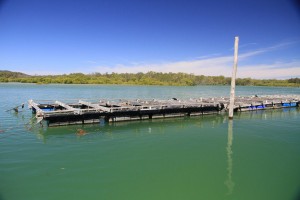Wooli Wooli (which means ‘two water’) was declared a camping reserve on 24 December 1861.
Surveyed in 1910, Wooli grew as a popular camping area under the control of Orara Shire and was declared a village in 1923.
The area from Sandon River to Dirty Creek was first dedicated as a Forest Reserve in 1908 and renamed several times (including as Wooli Wooli Forest Reserve), ultimately culminating in what is now Yuraygir National Park.
Early constructions at Wooli included houses, boat and vehicle sheds, and the occasional chook house.
 Fishing & oyster farming
Fishing & oyster farming
The first oyster leases in Wooli were established in 1885, costing 1 pound per annum.
Fishing, lobster trapping, boat building and oyster farming were significant activities during the 1900s, with large hauls of mullet and lobster not uncommon during the 1940s to 1960s.
Buildings and transport
Schooling took place via correspondence until 1942, when the Wooli Public School opened in the local hall, followed by the opening of a new school building in 1946.
In the early days, Wooli was connected to the outlying communities and towns via rough sulky tracks. The early bus and trucking service owners really earned their money, taking on all conditions – floods, bushfires and swamps.
In 1950, land ballots were introduced and blocks were cleared and fenced, which was a difficult task requiring manual labour.
December 1962 saw the connection of electricity to the village, while the water supply commenced in 1966.
Rock wall construction at the Wooli Wooli river entrance
 With some 20 commercial fishing boats working Wooli, port works commenced in the 1960s resulting in the river entrance being ‘trained’ by rock walls and a permanent sealed road constructed along the terrace to the river entrance.
With some 20 commercial fishing boats working Wooli, port works commenced in the 1960s resulting in the river entrance being ‘trained’ by rock walls and a permanent sealed road constructed along the terrace to the river entrance.
Wooli Volunteer Fire Brigade (est. 1966), Wooli Rescue Squad (est. 1978), NSW Police and SES (est 2002) provide emergency services to a community that now caters for a growing tourist population seeking to enjoy the diving, fishing and sightseeing in the Solitary Islands Marine Park, the flora and fauna of the Yuraygir National Park and Wooli Wooli River.
Further reading:
- Full history of Yuraygir National Park (“There Were Always People Here”).
- More about Wooli, the ideal get-away-from-it-all holiday destination on the NSW North Coast.